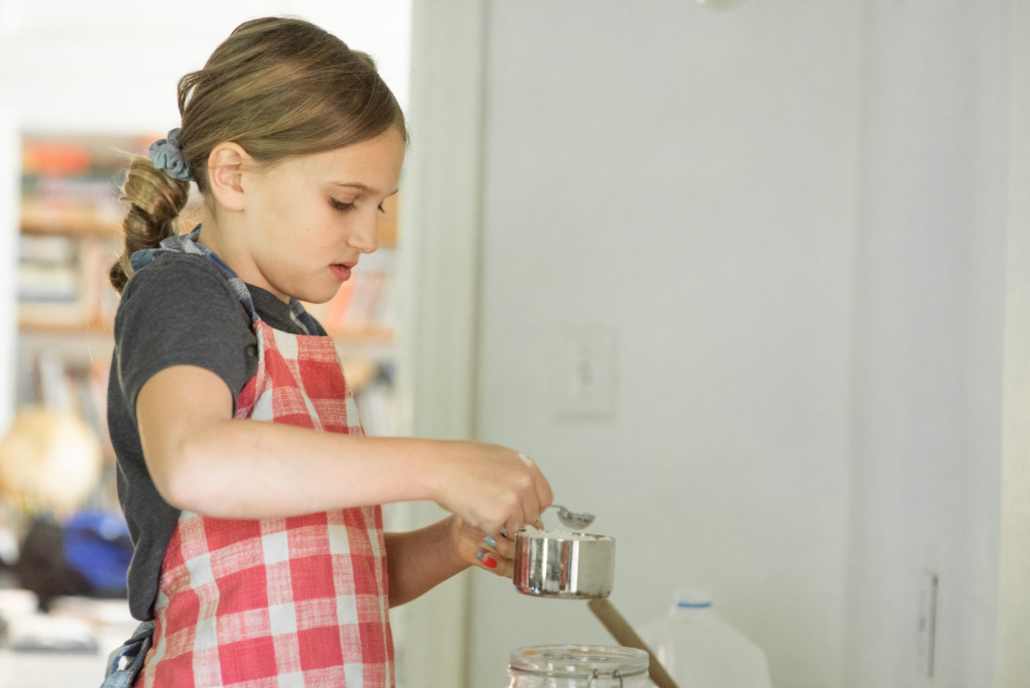
Perhaps the most uncomfortable truth of homeschooling is this: there is no track. There are various guidelines or expectations provided by the state government, but other than that, the studies and choices in what to do with a day or a year are left to the family. This idea is liberating and, at times, paralyzing. Considering most parents are new to homeschooling when they begin with their own children, it’s natural to look around for the handrails to show us where to begin.
Mark and I have always wanted to foster the enjoyment of learning, even for its own sake. As two idealists with degrees in English Literature, Writing, Philosophy, and European History between us (as well as plenty of foreign language studies), we love ideas and language, cultural arts and people. This seems important for context, in the same way that it is helpful to know when a parent enjoys discussing Euclidean geometry, music, business finance, farming practices, tech development, or home economics. As parents, we set the context and environments for our home, meaning there will be things we naturally impart to our children because of our own interests and experiences. These may take a little intention with books or discussion or experiences to develop, but they happen more organically within the home as an extension of who we are. The contrasting part to that truth is that we each have underdeveloped parts of us and entire bodies of studies that we know very little about––or as a good friend a few years ahead of me once consisely noted, “there will always be holes.” Part of this journey is accepting that I am not responsible for teaching my children everything they need to know about the world. I couldn’t possibly. The greater task is teaching them how to learn (basic fundementals–reading, asking questions, number functions, personal care, etc.) so that when they step into new arenas or interests in life–because they will–they will feel confident in how to start learning.
I mention all of this because I have always wanted the enjoyment of learning to usurp the task of learning. Both are required of course. I have often researched curriculum or books that best suit our famiy goals or the child’s interests. I have created plans and checklists not because everyone should use them but because it is the way I think and lead others, including my children. We set high expectations that our children will work hard at whatever they do, including their school work, but it is my theory that most children or adults fall out of interest with the rigor of learning something new at the point where they stopped understanding and forming connections. When frustration or discouragement are clouding our learning (collectively or with one child in particular), it has always been more fruitful in our home to put aside the plan and find the source of discouragement. Sometimes it has little to do with the task itself. Sometimes that has meant pausing for a day and starting fresh the next day; other times, that has meant tossing a curriculm or plan altogether and beginning with a new path. Sometimes it has looked like perseverance.
For me, keeping “on track,” requires a great deal of intuition, conversations with my children and observations of them. The “track” is always shifting and swerving in direction, but isn’t that true in life, too? We ask them about their interests and challenge them in areas they have natural aptitudes. If they struggle, we come alongside them with support. Our holes have always been in the maths and sciences, so I’ve always looked for stronger, clearer supports in those areas. In maths, we have always followed a curriculum, often looking for tutoring supports as they have gotten older. We complete the curriculum and move on to another level. With science, history, and literature in the grammar school years, we have relied more on literature, discussion, copywork or hands-on projects (illustration, experiments, etc) to learn. Sometimes we’ve used a curriculum to help guide us and other times we’ve simply followed our interests. As my children have entered the high school years, they have followed a science curriculum, but at that point, their own goals are beginning to take clearer shape, too.



Comments
Rereading this today. Thank you.
Thank you Bethany for writing this. Here in Arlington, VA we are surrounded by what everyone thinks is the Best School District. It’s all about testing and getting ahead.
My husband and I disagree on this, which is why I ended up homeschooling my daughters. You hit the nail on the head when you said it is paralyzing to have that freedom. That was me, not to mentioned incredibly stressed out of why my daughters weren’t able to learn math (After trying 4 different math curriculums) of what they should know based on their age. Then stressing that they would be behind our neighborhood kids when the other kids would ask them why they didn’t know certain things. But it’s like what you said, there will always be holes and teaching kids how to learn.
I do like the fact that you get tutors for subjects you are not familiar with or comfortable teaching. That and you just stop it for the day if need be. ( My oldest did want to go back to school to be around other kids besides her sisters and it crushed me, but we were fortunately to find an incredible Montessori school that they love and have tons of outdoor time. I did tell them I wanted to homeschool them starting in 7th grade and hopefully they will want to also.
Jessie, thank you for your thoughtful response and questions. Tutoring or finding more supports through Classical Conversations or other brief classroom experiences has been essential for me. It may not be for everyone, but I’m grateful for it, as are my children. Wink.
Good to regularly be reminded of our goals at large and not get lost in the details of the moment. Thank you!
Yes, it turns out, reminders are everything.
Great wisdom! Love being reminded of this truth.
Love you, friend. And I’m excited to catch up soon. x